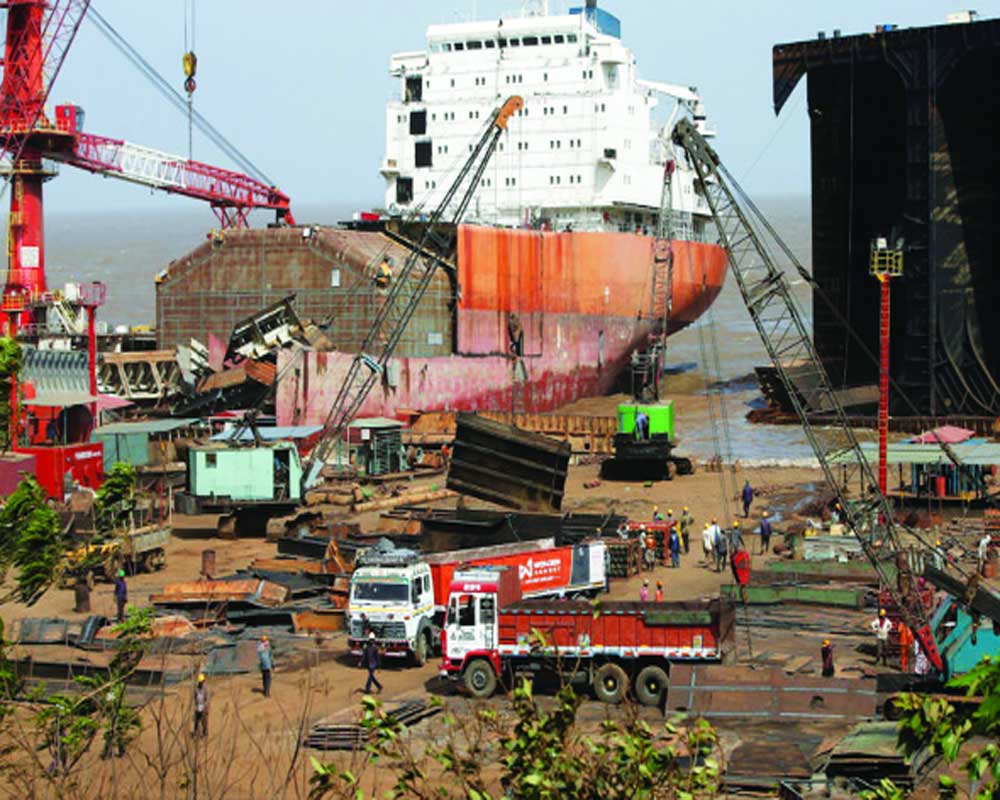The pipes and steel body of a vessel hold an average of 1,40,000 PPM mercury, that is released into the air during the dismantling process. This puts labourers and technical staff at risk
The ship-breaking business in India is booming as many nations across the world have completely banned dismantling of vessels on their soil, owing to public pressure over environmental concerns. However, the ship-breaking business in India is gaining notoriety thanks largely to the anti-environmental policies followed at the yards and the tremendous health risks involved.
A recent Dutch documentary has highlighted how environmental and safety norms are being flouted in Gujarat’s Alang ship-breaking yard. The documentary titled, ‘Het gifschip van SBM’ was aired on Zembla, a Dutch television documentary programme on September 12, 2019. The documentary shows how the Dutch company, SBM Offshore, concealed that a gas tanker it owned, which was to be scrapped in Alang, was contaminated with mercury. SBM Offshore provides floating production solutions to the offshore energy industry.
Many ships are contaminated with mercury, especially the ones converted to Floating Storage and Offloading (FSO) vessels. Stationed at gas fields, these vessels accumulate high levels of mercury, which gets attached to the steel walls of the tanker. In addition, mercury also contaminates ballast water. Some studies show that its presence is as high as 300 points per million (PPM) of mercury in 4,500 tonnes of ballast water. Furthermore the pipes and steel body hold an average of 1,40,000 PPM mercury, that is released into the air during the dismantling process. This puts labourers and technical staff at risk as mercury exposure can damage the central nervous system, kidney and cause liver impairment, reproductive and development disorders, defects in foetuses and learning deficits. Yet in spite of these conditions, the ships keep arriving at these yards and breaking continues round-the-clock. How these workers protect themselves against the health threats and what the Indian Government will do to take care of its people and the environment is anybody’s guess.
The work at the yards is largely still being done by hand. As such the risks and exposures attached to the business by way of accidents and chemical reactions are very high. This raises a pertinent question as to how the Government has not fully automated the breaking process as the heavy industry technology has made major progress over the last few decades. Big industrial corporations like Hitachi, Siemens and Hyundai specialise in heavy industry machinery. So why is the ship- breaking industry still hand driven? The Government must step in and increase automation at these yards. Not only will this benefit the workers, it will also be easy to adhere to international ship-breaking guidelines.
Further, public awareness about this business and its impact on people’s health and the environment is low. This needs to change because with awareness comes safety.
The Government, which is always on the back foot on this subject as it’s a business fraught with risks, can use technology as a way out of this conundrum.
It can begin an online portal, which deals with scrapping of any harmful object, be it as small as white goods and e-waste to as large as ships. The portal, under different heads, can give information and live feed of the various dismantling and waste processing facilities. This information will bring transparency on adherence to norms concerning health and environment safeguards. This will also earn the Government the respect of the common man.
While the ship-breaking business has been the focus of many researches and studies, the lot of the people on the ground and the immediate environment, whether it is the sea or the ambient air quality, has more or less remained unchanged. With such glaring examples of pollution in front of us, it seems that the authorities in India, both executive and judicial, seem to have trained their guns elsewhere and on smaller sources of pollution. This seems particularly true when one examines the fact that ship-breaking possibly is the only activity that has the dubious capability of polluting the air, sea water and harming human health all in one go and under one activity.
Surely this cannot be ignored and allowed to continue as it has thrived long enough and consumed enough human lives and environmental assets.
(The writer is an environmental journalist)


























